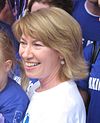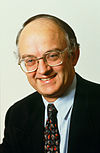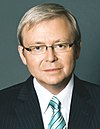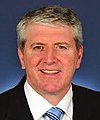First Rudd ministry
First Rudd ministry | |
|---|---|
64th ministry of Australia | |
 Governor-General Michael Jeffery with first arrangement of newly appointed ministers to the Rudd ministry | |
| Date formed | 3 December 2007 |
| Date dissolved | 24 June 2010 |
| People and organisations | |
| Monarch | Elizabeth II |
| Governor-General | Michael Jeffery Quentin Bryce |
| Prime Minister | Kevin Rudd |
| Deputy Prime Minister | Julia Gillard |
| No. of ministers | 32 (plus 14 Parliamentary Secretaries) |
| Member party | Labor |
| Status in legislature | Majority government 83 / 150 |
| Opposition cabinet | Nelson Turnbull Abbott |
| Opposition party | Liberal–National coalition |
| Opposition leader | Brendan Nelson Malcolm Turnbull Tony Abbott |
| History | |
| Election(s) | 24 November 2007 |
| Legislature term(s) | 42nd |
| Predecessor | Fourth Howard Ministry |
| Successor | First Gillard Ministry |
| ||
|---|---|---|
Prime Minister of Australia First term of government (2007–2010)
Second term of government (2013) Ministries Elections |
||
The first Rudd ministry (Labor) was the 64th ministry of the Government of Australia. It was led by the country's 26th Prime Minister, Kevin Rudd. The first Rudd ministry succeeded the Fourth Howard Ministry, which dissolved on 3 December 2007 following the federal election that took place on 24 November which saw Labor defeat John Howard's Liberal–National Coalition. The ministry was replaced by the First Gillard Ministry on 24 June 2010 following the resignation of Rudd as Prime Minister after a successful leadership challenge by Julia Gillard.[1]
Cabinet
Outer ministry
Parliamentary Secretaries
| Party | Minister | Portrait | Portfolio | |
|---|---|---|---|---|
| Labor | Hon Maxine McKew (1953–) |

|
| |
| Hon Dr Mike Kelly AM (1960–) MP for Eden-Monaro |

|
| ||
| Hon Gary Gray AO (1958–) |

|
| ||
| Hon Bill Shorten (1967–) MP for Maribyrnong |

|
| ||
| Hon Bob McMullan (1947–) |

|
| ||
| Hon Duncan Kerr SC (1952–) |

|
| ||
| Hon Anthony Byrne (1962–) |

|
| ||
| Hon Dr Ursula Stephens (1954–) Senator for New South Wales |

|
| ||
| Hon John Murphy (1950–) |

|
| ||
| Hon Jan McLucas (1958–) Senator for Queensland |

|
| ||
| Hon Laurie Ferguson (1952–) |

|
| ||
| Hon Jason Clare (1972–) |

|
| ||
| Hon Mark Butler (1970–) MP for Port Adelaide |

|
| ||
| Hon Richard Marles (1967–) |

|
| ||
Changes to the Ministry
Changes from Rudd shadow ministry
Prior to Labor's election to government, in line with long-standing parliamentary convention, Rudd led a shadow cabinet consisting of opposition spokespeople on a range of portfolios. Following the election, some changes were made to this configuration before the Ministry was sworn in.
Peter Garrett was sworn in as Minister for the Environment, Heritage and the Arts, but his shadow portfolio had included Climate Change and Water, which went to Senator Penny Wong. Three previous shadow ministers — Arch Bevis, Kate Lundy and Kerry O'Brien — were relegated to the back bench, while three others — Jan McLucas, Laurie Ferguson and Bob McMullan — were only sworn in as parliamentary secretaries.[2]
Some portfolio responsibilities changed due to Julia Gillard's appointment as Minister for Education. Tanya Plibersek's responsibilities were reduced, with Human Services transferring to Joe Ludwig, the shadow Attorney-General. Robert McClelland became Attorney-General, while Stephen Smith became Minister for Foreign Affairs in lieu of Education.
While the former Shadow Minister for Finance Lindsay Tanner retained his portfolio, the ministry and department underwent a name change to Finance and Deregulation.
February 2009 changes
On 25 February 2009, Prime Minister Kevin Rudd announced a reshuffle of his Parliamentary Secretaries (the lowest ministerial rank), following the resignation of John Murphy.[3] The reshuffle also saw the appointment of Senator Mark Arbib as Parliamentary Secretary for Government Service Delivery. Bill Shorten added Victorian Bushfire Reconstruction to his responsibilities of Disabilities and Children's Services.
June 2009 reshuffle
On 9 June 2009, a significant reshuffle of the ministry took place. It was prompted by Defence Minister Joel Fitzgibbon's resignation from cabinet after a series of embarrassing events and revelations harmed his reputation, along with a generally held view that his relationship with his department had irretrievably broken down.[4][5] The changes were announced by Rudd on 5 June 2009. Labor veteran Senator John Faulkner, previously Special Minister for State and responsible for the government's electoral reform package, was appointed to the role. He was the first person from the Left faction of the ALP to hold the position since World War II.[6] Other changes of note included the elevation of Greg Combet and Senator Mark Arbib from parliamentary secretaries to the Outer Ministry, and Bob Debus's retirement from the ministry. The new ministers were all sworn in on 9 June.[7][8]
Other changes
On 14 December 2009, Duncan Kerr's appointment as Parliamentary Secretary for International Development Assistance was terminated following his announcement that he would retire at the next election.[9]
On 8 March 2010, Peter Garrett's title was changed from Minister for Environment, Heritage and the Arts to Minister for Environment Protection, Heritage and the Arts. This was in response to the perceived mishandling of one of the government's stimulus programs. Several of Garrett's environmental responsibilities were transferred to Senator Penny Wong, whose title changed from Minister for Climate Change and Water to Minister for Climate Change, Energy Efficiency and Water.[10]
On 1 April 2010 Greg Combet became Minister for Defence Materiel and Science (losing "personnel") and Minister Assisting the Minister for Climate Change and Energy Efficiency and Alan Griffin added Minister for Defence Personnel to his position as Minister for Veterans' Affairs.[11]
On 14 April 2010 Tony Burke was appointed the inaugural Minister for Population.[12]
See also
External links
- "Rudd ministry, 3 December 2007 – 25 February 2009". Parliament of Australia. Archived from the original on 8 October 2010. Retrieved 17 September 2010.
- Commonwealth of Australia (3 December 2007). "Commonwealth of Australia Gazette, No. S248 of 2007" (PDF). Retrieved 3 February 2012.
Notes
- ^ "Historical information on the Australian Parliament". Parliamentary Handbook. Parliament of Australia. Retrieved 8 July 2013.
- ^ "Gillard wins plum roles". The Age. Australia. 30 November 2007.
- ^ "Rudd ministry, 25 February 2009 – 9 June 2009". Parliament of Australia. Archived from the original on 8 October 2010. Retrieved 17 September 2010.
- ^ Wanna, John (December 2009). "Australian Political Chronicle: January–June 2009". Australian Journal of Politics and History. 55 (4): 590. ISSN 0004-9522.
- ^ "More dirt to come' on Fitzgibbon". ABC Online. 5 June 2009. Retrieved 3 February 2012.
- ^ Coorey, Phillip (6 June 2009). "Faulkner takes aim at Defence". The Sydney Morning Herald. Retrieved 3 February 2012.
- ^ "Rudd ministry, 9 June 2009 – 14 December 2009". Parliament of Australia. Archived from the original on 8 October 2010. Retrieved 17 September 2010.
- ^ "Rudd's new look team sworn in". ABC Online. 9 June 2009. Retrieved 3 February 2012.
- ^ "Rudd ministry, 14 December 2009 – 8 March 2010". Parliament of Australia. Archived from the original on 8 October 2010. Retrieved 17 September 2010.
- ^ "Rudd ministry, 8 March 2010 – 1 April 2010". Parliament of Australia. Archived from the original on 8 October 2010. Retrieved 17 September 2010.
- ^ "Rudd ministry, 1 April 2010 – 14 April 2010". Parliament of Australia. Archived from the original on 8 October 2010. Retrieved 19 September 2010.
- ^ "Rudd ministry, 14 April 2010 – 24 June 2010". Parliament of Australia. Archived from the original on 8 October 2010. Retrieved 17 September 2010.

































